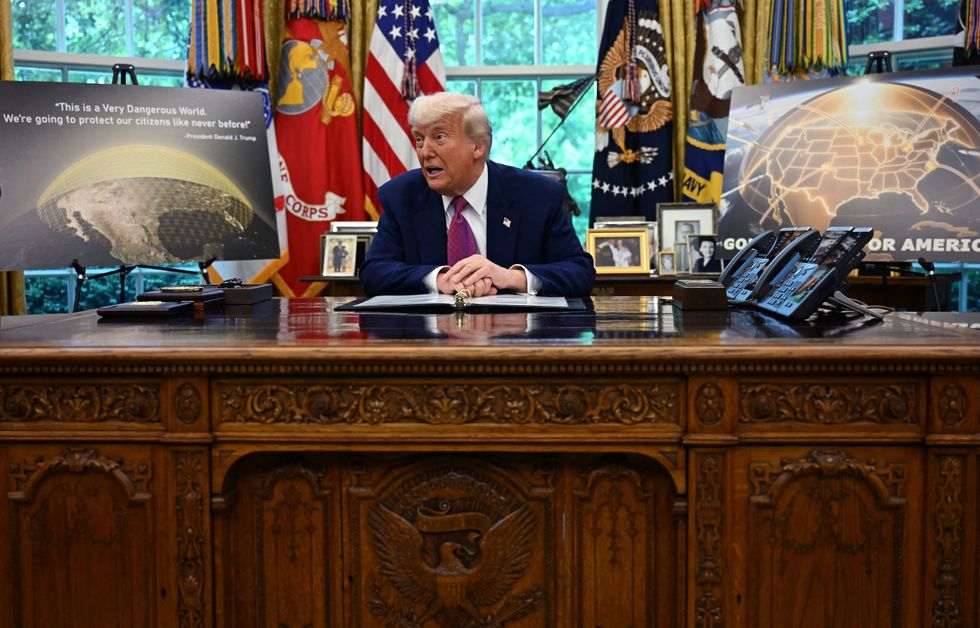Politics
U.S. Launches Golden Dome Initiative for Space-Based Missile Defense

The United States has initiated a groundbreaking defense program known as the Golden Dome, aimed at enhancing its missile defense capabilities against threats from adversaries such as Russia, China, Iran, and North Korea. Announced by President Donald Trump in July 2023, the initiative seeks to establish a space-based missile defense system equipped to intercept intercontinental ballistic missiles (ICBMs) and hypersonic glide vehicles. This ambitious project has a projected budget of $175 billion, primarily benefiting defense contractors like Lockheed Martin, RTX (formerly Raytheon), and L3Harris.
The name Golden Dome draws inspiration from Israel’s successful Iron Dome system. While the Iron Dome provides localized defense against short-range threats, the Golden Dome is envisioned as a comprehensive planetary shield. This program reflects a significant shift in U.S. defense policy, addressing the evolving missile threats that have escalated over the past four decades.
Ambitious Goals and Strategic Locations
During the program’s announcement on May 20, 2023, President Trump emphasized the goal of having the system operational before the end of his term. Key states such as Alaska, Florida, Georgia, and Indiana were identified as crucial to the implementation of Golden Dome. These states host essential military infrastructure, including long-range radar systems and launch facilities, which play a strategic role in the defense initiative.
The Golden Dome program consists of space-based interceptors (SBIs) and missile-tracking satellites that will work in conjunction with existing ground and sea defense systems. The Congressional Budget Office has raised concerns regarding the project’s cost, suggesting that expenses could exceed $540 billion over the next two decades. Despite these challenges, funding has been allocated, with approximately $40 billion earmarked for the U.S. Space Force, including $24.4 billion directly for Golden Dome.
Technical Challenges and Future Implications
The operational framework of Golden Dome involves several critical components. Satellites equipped with infrared sensors will detect missile launches and track their trajectories. New SBIs are designed to intercept missiles during their initial launch phase, maximizing the chances of successful interception. Should any threats bypass this layer, existing defenses, such as the Navy’s Aegis system and the Army’s Terminal High Altitude Area Defense (THAAD) systems, will engage.
General Michael Guetlein, head of the Golden Dome Program, acknowledged the technical challenges posed by such an ambitious initiative. He stated, “The real technical challenge will be the building of the space-based interceptor. The technology exists, but we must prove we can implement it economically and at scale.” Experts in the field, including Dr. Patrick Binning from Johns Hopkins University, have labeled the boost-phase intercept capability as the “holy grail” of missile defense, underscoring the complexity and potential costs associated with the program.
While the Golden Dome aims to enhance national security, it also carries significant political implications. Analysts suggest that successful testing and initial deployments are critical before the 2028 election, as a robust missile defense system could influence public opinion and political dynamics.
In addition to its primary defense role, proponents argue that Golden Dome could protect U.S. satellites from anti-satellite weapons developed by rival nations, thereby safeguarding U.S. interests in space. The program is not merely about missile defense; it also represents a strategic pivot in how the U.S. engages with global adversaries.
As the initiative progresses, its success will hinge on overcoming engineering challenges, maintaining funding support, and executing a coherent strategy. The coming months will be pivotal in determining whether this ambitious defense project can transition from concept to reality, ensuring that the U.S. remains prepared against evolving threats.
-

 Health3 months ago
Health3 months agoNeurologist Warns Excessive Use of Supplements Can Harm Brain
-

 Health3 months ago
Health3 months agoFiona Phillips’ Husband Shares Heartfelt Update on Her Alzheimer’s Journey
-

 Science1 month ago
Science1 month agoBrian Cox Addresses Claims of Alien Probe in 3I/ATLAS Discovery
-

 Science1 month ago
Science1 month agoNASA Investigates Unusual Comet 3I/ATLAS; New Findings Emerge
-

 Science4 weeks ago
Science4 weeks agoScientists Examine 3I/ATLAS: Alien Artifact or Cosmic Oddity?
-

 Science4 weeks ago
Science4 weeks agoNASA Investigates Speedy Object 3I/ATLAS, Sparking Speculation
-

 Entertainment4 months ago
Entertainment4 months agoKerry Katona Discusses Future Baby Plans and Brian McFadden’s Wedding
-

 Entertainment4 months ago
Entertainment4 months agoEmmerdale Faces Tension as Dylan and April’s Lives Hang in the Balance
-

 World3 months ago
World3 months agoCole Palmer’s Cryptic Message to Kobbie Mainoo Following Loan Talks
-

 Science4 weeks ago
Science4 weeks agoNASA Scientists Explore Origins of 3I/ATLAS, a Fast-Moving Visitor
-

 Entertainment4 months ago
Entertainment4 months agoLove Island Star Toni Laite’s Mother Expresses Disappointment Over Coupling Decision
-

 Entertainment3 months ago
Entertainment3 months agoMajor Cast Changes at Coronation Street: Exits and Returns in 2025









